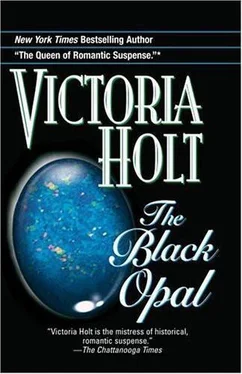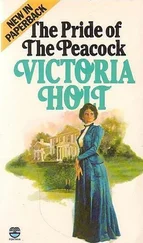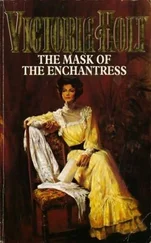“There was this thing hanging round your neck.”
I said: “I know. I have always kept it a pendant. It’s on a chain and it’s got markings on it.”
“The doctor looked at it and said, ” They’re Romany signs . or something like that. She must have come from the gipsies. “
“Nanny was ever so pleased, because that was what she’d thought.
“I knew it,” she said.
“Coming here in them woods. It ought not to be allowed.” The doctor held up his hand. You know the way he has . as though he didn’t want to hear her, but you know Nanny. She thought she was right and she said the sooner the baby was on its way to the orphanage the better. It was the proper place for you.
“The doctor said, ” Can you be sure of that. Nanny? “
‘ “Well,” said Nanny, “she’s a regular little gipsy, sir. It should be the poorhouse or the orphanage for that sort.”
‘ “Can you be sure what sort she is?” His voice was all cold like, and Nanny should have noticed, but she was so sure she was right. She said: “There’s no doubt in my mind.”
‘“Then you are very discerning,” he said.
“But to me this child’s origins are not obvious as yet.”
“You started to bawl at the top of your voice and I was dying to tell you to stop, ‘cos, with your face all red and screwed up, you wasn’t the prettiest sight, and I thought:
They’ll get rid of you, you silly baby, if you go on like that, and how are you going to like that orphanage?
‘” think, sir” Nanny started to say, but the doctor stopped her.
‘ “Don’t make the effort, Nanny,” he said, which was a polite way of saying “shut up” “Mrs. Marline and I will decide what is to be done.”
“I thought: She will, you mean. You’re not going to have much say in it and it will be the orphanage for that baby.
“I was wrong. I can’t think what made Mrs. Marline change her mind.
She’d been all for getting you out of the house as quick as she could.
To this day I can’t think what happened. Well, Nanny had to do what the doctor ordered, so she washed you and put you into some of Miss Estella’s clothes, and you looked like a proper baby then. We heard that you were to stay at Commonwood for a while because someone might claim you which seemed unlikely since whoever you belonged to had just left you under that azalea bush.
“Nanny said, ” The doctor’s soft, but it won’t be him who has the last word. Mistress will be the one who has that. He can’t see that it’s better for that baby to go now, before she gets to know the ways of gentlefolk. “
“Nanny was wrong. She could have sworn Mistress would have had that baby out of the house in next to no time. But, for some reason, she had to do what the doctor wanted.”
So I stayed in Commonwood House and what was most extraordinary was that I was to share the nursery with the Marline children.
“You was more my little baby than anyone else’s,” Sally said.
“I took to you and you took to me. Nanny couldn’t forget how you’d come. You didn’t belong here, she said.
She couldn’t bring herself to treat you like the others, never had and never would. “
I knew that well enough. As for Mrs. Marline, she scarcely ever glanced at me, though once or twice, when I caught her doing so, she looked quickly away. The doctor was aloof on the rare occasions when I encountered him, but he always gave me a vacant smile and sometimes patted my head and said, “All right?” to which I would nod nervously and he would nod in return and quickly pass on, as though eager to get away from me.
Adeline was always gentle. She liked babies and helped me when I was small. She used to hold my hand when I was learning to walk; she showed me pictures in the nursery books and seemed to delight in them as much as I did.
Estella was in turn friendly and hostile. It seemed that she sometimes remembered Nanny’s contempt for me and shared it. At other times she treated me like a sister.
As for Henry, he took little notice of me, but, as he appeared to have no time for any girls or people younger than himself and that included his sister it was not hurtful in the least.
It was some time before they decided I must have a name. I had always been referred to as ‘the Child’, or by Nanny as ‘that gipsy’.
Sally told me how it had come about. Sally was interested in names.
“Ever since I heard mine meant ” Princess”. That’s Sarah, see? Well, they was going to call you Rose. Tom Yardley was always telling how he’d gone out to look at the roses he’d just planted when he found you under the azalea bush. So they thought Rose would be a good name for you. I didn’t like it. You wasn’t a Rose to me. There are lots of Roses. You were somehow different. I thought you had something of the look of a little gipsy. Once I’d heard of somebody who was a gipsy called Carmen … no, it was Carmel, I think. And, do you know, when I found out Carmel meant a garden, well, it was right, wasn’t it? You couldn’t be anything else but Carmel. Wasn’t you found in the garden?
“Carmel,” I said.
“That’s her name. Couldn’t be anything else.” Nobody minded much and they all started calling you Carmel. Then March . it was March when Tom Yardley found you. So, you could say I named you. “
“Thank you. Sally,” I said.
“There are a lot of Roses.” So there I was. Carmel March, origins unknown, living in Commonwood House by the grace of Dr. Marline and suffered with something less than grace by his masterful wife and Nanny Gilroy.
It was perhaps not surprising that I grew up to be what Nanny Gilroy called ‘pushing’. In that household, where I had to fend for myself in a way, I had constantly to make people understand that I did not intend to be treated as a person of no importance. I had to make them understand that, although my origins might be obscure, I was as good as any of them.
In those early days, my domain was mostly the nursery where Nanny Gilroy made a distinct difference in her treatment between me and the others. I was the outsider, and although I had to admit the truth of this, at the same time I had to show them that there was something rather special about being a person of mystery. I was there on sufferance because of a strange idea the doctor had got into his head about orphan children, and for an even stranger reason that Mrs. Marline had let it pass, so I was defiant. I told myself I was as good as any of them. This made me assertive.
“Gipsy blood!” commented Nanny.
“Weren’t they always pushing in with their clothes pegs and trying to tempt you into crossing their hands with silver in return for their telling you some trumped-up tale about the great fortune that would be yours?”
I wondered a good deal about the gipsies and tried to find out all I could. I discovered they lived in caravans and travelled from place to place. To me they were mysterious and romantic people. And it was almost certain that I was one of them.
Miss Mary Harley used to come to the house to teach us.
She was the vicar’s daughter very tall, angular with untidy, wispy hair which kept escaping from the hairpins which were intended to control it. She was nervous and self-effacing, and, I know now, not very effectual. But she was kind and, as I was very appreciative of any kindness which came my way, I was fond of her.
She came because Mrs. Marline had said the children were too young to go away to school and Miss Harley would do very well until that time came.
Miss Harley was very pleased to come. I had heard Nanny Gilroy comment to Mrs. Barton, the cook, that she would be glad of the money. There wasn’t much of that to spare at the vicarage, and not surprising with that barn of a place to keep up and three daughters to marry off and none of them much to look at. Everyone said the vicarage family was as poor as their church mice, and the money would come in handy.
Читать дальше








